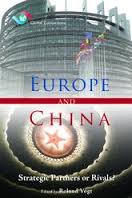Europe and China: Strategic Partners or Rivals?
Just half a century after De Gaulle’s vision that Europe (‘from the Atlantic to the Urals’) would decide the destiny of the world, Europe looks anything like a global powerhouse. With the euro falling apart, European authority is regarded by many, with barely concealed disdain.
From Britain to Bulgaria, the European Union is seldom mentioned without the suffix ‘crisis’, and the phrase ‘European integration’ is widely held to be an oxymoron. In June 2012, the Economist magazine cited a Pew Research Centre study showing that ‘only a minority agree that EU membership is a “good thing”.’
So it is useful to read a series of recent academic papers examining Europe’s belief in its ‘normative authority’ in world affairs. In ‘Europe and China: Strategic Partners or Rivals?’ the authors’ ambition is to situate the waning European project in relation to China’s rise. It explores why Europe hasn’t formulated a coherent strategy towards the East and suggests that it has much to do with the loss of its own cohesion in the West. The book is something of an advisory note about how to rectify Europe’s identity crisis.
The series of essays are organised in two parts: the first examines the changing international order and the second looks at a series of issues – from human rights to energy security – that form some of the so-called new multilateralist approaches to global relations.
The first few chapters set the scene. In brief the argument states that while China needs Europe as a source of investment and advanced technology; and Europe needs China as an export market, neither have formalised this strategically. The book is primarily written from the European perspective suggesting that one of the key problems for Europe ‘is not (being) able to persuasively define its interests in the region, let alone its strategic ones’. (p4) This vacuum is put down to a lack of clear leadership. However, as Greece’s recent elections indicate, a leader can simply be a technocratic solution: a mechanistic way of excusing the lack of clear political purpose. Conversely, leadership as a political vision should be something to cohere – or challenge – the current stalemate.
Vogt’s suggestion that ‘China’s rise could indeed become a catalyst of European integration’ comes across as wishful thinking. Such fatalism has come to characterise contemporary European politics. It is a viewpoint that looks to outside forces – rather than internal dynamics – to resolve the problem. Indeed, many of the authors seem oblivious to the dangers implicit in what Montesquieu once called the ‘politics of drift’.
A number of opening chapters repeat the interesting but slightly academic discourse about whether Europe has a ‘strategic’, ‘constructive’, ‘comprehensive’ or even a ‘strategic, comprehensive and stable’ relationship with China. Song, writing about the opportunities presented by recent changed circumstances, emphasises that the EU is no longer a global political power and resolves that its ‘expectations will have to be reduced’ (p33) lest it be marginalised altogether in China’s growing trade relations with East Asia. There is a palpable sense of ‘keep your heads down and maybe it’ll go away’. Not the most inspiring international relations agenda.
Pan goes so far to argue that even constructive engagement can be dangerous. This somewhat counter-intuitive position stems from the notion that Europe’s normative position has been justified on its ‘moral authority in an otherwise flawed world’ (p43). It is, Pan says, based on the ‘false premise that the Chinese Other ought to and can be transformed into the European Self’.(p45) Whether one agrees or not, this is a relativistic posture that tends to undermine some significant value judgements cultivated throughout European history. No longer can the authors (nor European leaders, it seems) defend human rights, democracy and freedom in their own terms and they resolve that these are not necessarily things to ram down the throats of our Chinese partners. We should be more ‘modest’ and ‘contingent’ and engage in ‘cosmopolitan engagement’. This kind of pragmatic real-politik, in the absence of robust critical engagement, poses a potential threat to the Western Enlightenment tradition.
In its place we have the ‘soft’ universalism of Environmentalism, which is posited as the new vision for interdependency between the two blocs. In a political climate where ideological battles seem not to exist, concern about the environment is an easy option. Arguing for leadership through trade, investment, growth and development are gone, it is argued; the new way forward is a moral leadership that comes from environmental righteousness and the recognition that Sino-European relations are becoming increasingly dominated by ‘human rights and religious freedom, energy and environmental protection’.
The suggestion that these ‘values’ are tangential to, or separate from, ‘trade’ is a point of some contention. Environmentalism and energy politics may not be rooted in trade, per se, but their influence on what economist Daniel Ben-Ami has called ‘growth scepticism’, means that these ideas are having a significant restraining effect on economic development. Indeed, the environmental New Economic Foundation demands ‘sustainability adjustment programmes’, unashamedly harking back to the IMF’s reviled Structural Adjustment Programmes.
But beyond that, the message is simple: old school international relations are too polarised and challenging, whereas everyone loves sustainability. This gives Europe some moral might that will allow it to punch above its weight. Even though there are some very interesting chapters here, unfortunately, the authors fail to address whether this positioning is an evasion, rather than a resolution, of global forces.
Roland Vogt (ed), ‘Europe and China: Strategic Partners or Rivals?’ Hong Kong University Press, 2012, pp283.
ISBN 978-988-8033-88-6
This review featured in the Journal of the Royal Asiatic Society China, Vol 75, No 1, 2013







